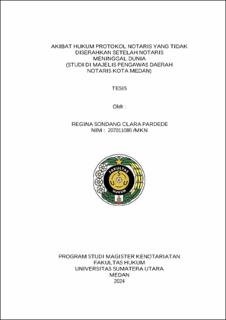Akibat Hukum Protokol Notaris yang Tidak Diserahkan Setelah Notaris Meninggal Dunia (Studi di Majelis Pengawas Daerah Notaris Kota Medan)
Legal Consequences of Notary Protocols That Are Not Submitted After The Notary Dies (Study at Regional Supervisory Council Medan City Notary)

Date
2024Author
Pardede, Regina Sondang Clara
Advisor(s)
Kamello, Tan
Agustining
Tony
Metadata
Show full item recordAbstract
The Notary Protocol is a collection of documents which constitute the State Archives which must be kept and maintained by the Notary in accordance with the provisions of statutory regulations. Based on Article 15 paragraph (1), Article 16 paragraph (1) letter b, Article 58, Article 59, and Article 63 UUJN/UUJN-P, the Notary is responsible for keeping the Notarial deed and Protocol throughout his or her lifetime of office and will be continued by another Notary or his replacement. The formulation of the problem in this thesis is how the UUJN regulates the protocols of notaries who have died and are not handed over to their heirs, what are the legal consequences of not handing over notary protocols belonging to notaries who have died by parties who are obliged to hand over notary protocols, what are the legal remedies for interested parties? regarding the consequences of not submitting a notary protocol belonging to a notary who has died.
The research was carried out using legal research, namely normative juridical which is descriptive analytical in nature, which is research that aims to describe a situation or symptom or to determine whether there is a relationship between a symptom and another symptom. The data collection technique used was literature study.
The results of the research and discussion show that the regulations regarding notary protocols belonging to notaries who have died based on the Law on the Position of Notaries are regulated in Article 35, Article 62, Article 63 UUJN and Article 39 of Permenkumham Number 19 of 2019. The legal consequences of not submitting a notary protocol that has been the death of the party who is obliged to submit the notarial protocol, causing the gross deed, copy of the deed or extract of the deed not to be given, shown or notified to the public who have a direct interest in the deed, heirs or persons who have acquired rights, then proof of the authenticity of the authentic deed made by The notary concerned will experience difficulties in the judicial process. Legal remedies for those interested in the consequences of not submitting the notarial protocol belonging to a notary who has died have not been strictly regulated in statutory regulations, so that the remedies that can be taken are that the heirs can be sued through a civil and/or criminal lawsuit in court. If it turns out that the document in question is proven to cause loss or is proven to violate criminal law such as embezzlement, then the court can impose civil or criminal sanctions.
Collections
- Master Theses (Notary) [2330]
